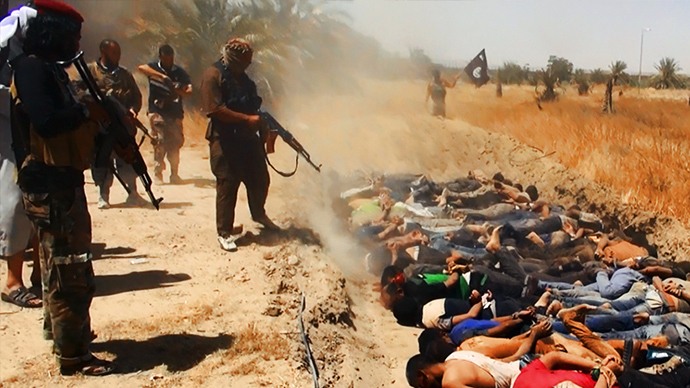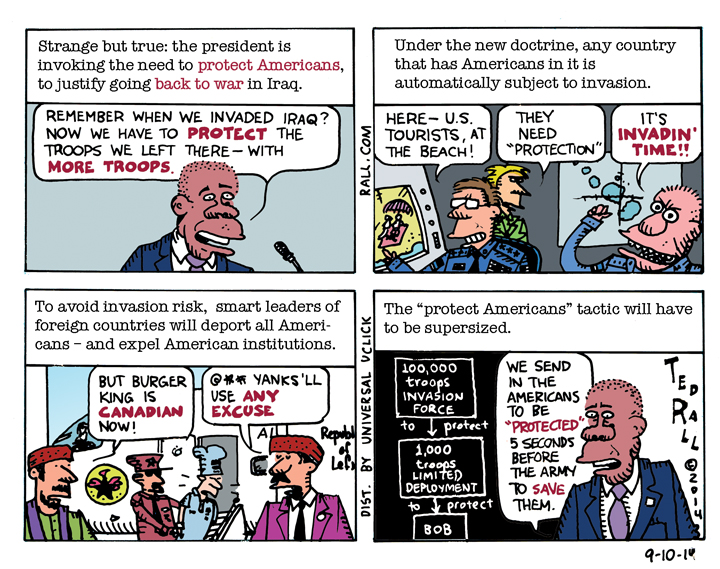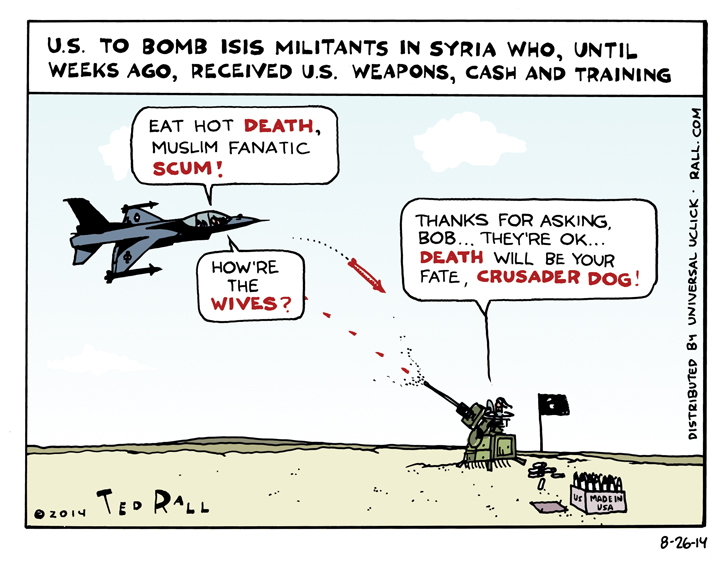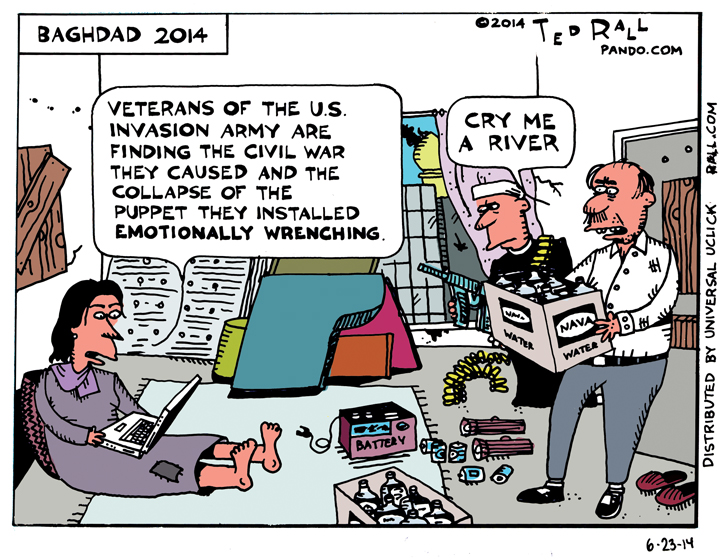Obama says the US should resume bombing Iraq, and send troops back there, in order to protect diplomatic personnel and troops who remained there after the occupation was nominally ended. By this logic, the United States can invade any country with Americans in it.
The Enemy of My Enemy Is Me
Until a few weeks ago, the United States was sending weapons and money to the Islamic State in Syria, and providing covert training both directly through the CIA and indirectly through the Gulf Arab states. Now the US is seriously considering bombing ISIS not only in Iraq, but in Syria, where we supported them in their fight against President Bashar al-Assad. At some point, this gets confusing, no?
SYNDICATED COLUMN: “Ask the Pundit”: What Should the U.S. Do About ISIS?

Reader Brian McManus asks:
“Just wondering if you can find time to post a piece on what the U.S. should do (or not do) regarding the current situation with ISIS in Iraq. Not so much on how the situation got to be where it is, but what the U.S. and/or other nations should do in situations like this. Would appreciate your thoughts on the issue.”
Thanks for writing, Brian.
Americans are “can do” people. Optimism is an appealing national personality trait but it comes with the unfortunate tendency to overestimate what can be done and its more dangerous corollary, the will to act when doing nothing would be preferable.
We saw the pitfalls of can-do following 9/11. Initial reactions to the attacks were shock and confusion. Traditional ideological divides were blurred, but in those early days one could still discern the pre-GWOT liberal tendency toward treating terrorism as a law enforcement issue, versus the old hawkish rightist desire to lash out militarily. Then the Right trotted out a line that resonated across the spectrum and caused the antiwar left to dissolve as into mist:
We have to do something.
In the United States, “something” means military action.
The thing we “have” to do “something” about always refers to foreign policy.
Americans don’t feel that “have to do something” about domestic problems. Poverty? No need to act. Corrupt bankers? Inaction is fine. But if a crisis flares up overseas (a civil war as in Syria or Libya, a siege of civilians as in Sarajevo or Iraqi Kurdistan, cross-border encroachment as in ex-Soviet Georgia or Crimea), and especially if it involves opponents the media categorizes as “bad guys” (regional economic rivals such as Iran, China or Russia, radical Islamists who may or may not have gotten their guns from us), “we” “have” “to” “do” “something” (military action).
This is not true.
There are always alternatives to military action. The success of the formerly Al Qaeda-affiliated Islamic State of Iraq and Syria insurgency, which controls half of both countries, is no exception. Half-measures come in both military (money and weapons) and non-military (political advisors) forms.
We can do nothing.
Albania is doing nothing in Iraq. Cuba is doing nothing in Iraq. Vietnam is doing nothing in Iraq. These countries have not been harmed by their refusal to intervene militarily in Iraq.
As I see it, Brian, whatever appetite ordinary Americans have for Obama’s airstrikes against ISIS and other attempts to prop up the current regime in Baghdad stems from the investment of lives and treasure the U.S. has made since the 2003 invasion.
“To be sure, the cost was high,” then-Secretary of State Leon Panetta said when Obama ordered the main troop withdrawal from Iraq. “But those lives were not lost in vain. They gave birth to an independent, free, and sovereign Iraq.”
If ISIS captures Baghdad and establishes Taliban-style Sharia law throughout Iraq, complete with amputations of accused thieves and stonings of wayward women — leaving Iraq, already in worse shape than it was under Saddam, an unequivocal nightmare for its people and a base for radical jihadis out to overthrow U.S. allies like Saudi Arabia — Panetta’s statement will have been belied.
The war will have been exposed as a total waste.
Which it was. Every American who lost a life or a limb in Iraq was sacrificed stupidly, predictably, in a war that never could have been won even had the generals and politicians in charge of it weren’t idiots.
The attempt to salvage Iraq by saving the rump Iraqi state inside the Green Zone is a refusal to accept defeat. But that doesn’t change reality.
We lost the Iraq War years ago. The sooner we accept that there is nothing to be saved there and move on, the better off we’ll be.
Undeniably and regrettably, washing our hands of Iraq — aside from leaving ISIS alone, we ought to evacuate the embassy and other government personnel Obama says we need to “protect” — will result in awful consequences. Whether or not ISIS can close the deal by capturing Baghdad, the sectarian conflict will escalate. Areas within ISIS control will be lost for the foreseeable future. More civilians will die, many as the result of “ethnic cleansing.”
We know these things will happen because we’ve lost wars before. The U.S. withdrawal from Vietnam created the “boat people” crisis, opened space for wars between Vietnam and its neighbors China and Cambodia, and permitted a communist regime hostile to U.S. interests to consolidate power, and exclude American business for decades.
But consider the alternative.
Remaining in Vietnam would have required pouring more money and more soldiers down a hole, and slaughtering countless more Vietnamese. We still would have lost. All that post-withdrawal stuff — the civil conflicts, reprisals against our former local collaborators — would still have happened. It just would have happened later.
After we accepted defeat and walked away from Vietnam, on the other hand, things eventually worked out. Vietnam is now a major U.S. trading partner; nearly half a million American tourists visit Vietnam each year.
A guy named Barack Obama once summarized his foreign policy as “Don’t do stupid stuff” like invading Iraq in the first place. Hillary’s jibes and Obama’s actions aside, it’s good advice. To which I’ll add Ho Chi Minh’s legendary order to his general Vo Nguyen Giap, who was planning the decisive 1954 battle that would expel France from Indochina: “If victory is certain, then you are to attack. If victory is not certain, then you must resolutely refrain from attacking.”
Victory against ISIS is anything but certain. Therefore, in this and similar situations, I would refrain from attacking.
(Ted Rall, syndicated writer and cartoonist, is the author of “After We Kill You, We Will Welcome You Back As Honored Guests: Unembedded in Afghanistan,” out Sept. 2. Subscribe to Ted Rall at Beacon.)
COPYRIGHT 2014 TED RALL, DISTRIBUTED BY CREATORS.COM
Baghdad 2014
As Iraq spirals into sectarian civil war, one of the recurring stories on American media outlets is the mixed feelings of the American veterans who served in the invasion and subsequent occupation. While it’s understandable that they are wondering whether their sacrifices were worth it (hint: no way), shouldn’t we be giving at least equal time to the Iraqis who are living through the consequences of our war there?



